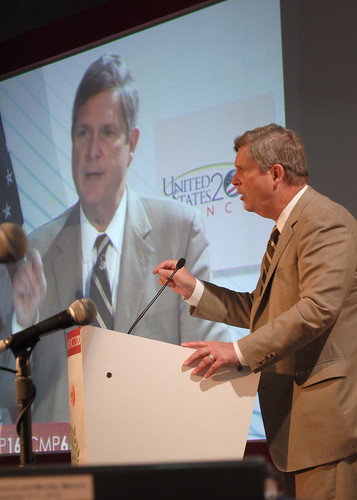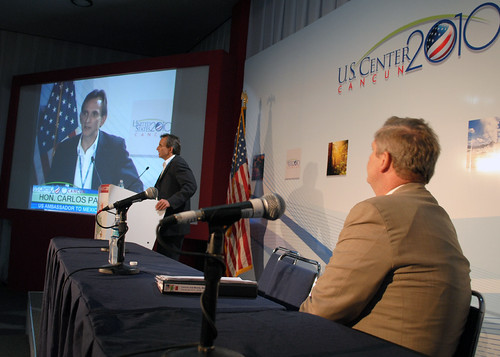
Earlier today it was my privilege to address those attending the United Nations Climate Change Conference in Cancun, Mexico. Climate change is one of the greatest threats facing our planet, and the United States is taking significant action to meet this challenge. Under President Obama’s leadership, the U.S. is advancing policies that address climate change by promoting energy efficiency in our homes, cars and businesses, increasing the domestic production of clean energy – including biofuels – and by investing in renewable energy technology. The United States is also vigorously engaged in international climate negotiations while continuing to work with Congress on domestic climate legislation.
President Obama believes, as I do, that we can advance clean energy and reduce greenhouse gas emissions while growing our economy. This is particularly true for America’s rural communities. Farmers are helping make America more energy independent while at the same time generating new rural income by producing renewable energy. And, I believe farmers, ranchers and forest owners have the potential to benefit from markets for greenhouse gas reductions that could provide other new economic opportunities.
To capture these opportunities, we need to provide American farmers and landowners with information on how protecting the environment through actions such as carbon sequestration, reduced nitrous oxide emissions from fertilization, and reduced emissions and methane capture for livestock can also bring economic savings.
Today, I announced steps to make farmers, ranchers, and forest landowners even better conservationists. Through these efforts, USDA will:
Demonstrate opportunities for farmers, ranchers and forest owners to reduce greenhouse gas emissions and increase sequestration while improving their bottom line.
Provide opportunities to leverage private sector demand for greenhouse gas mitigation services.
Evaluate how emerging voluntary and State greenhouse gas markets and USDA conservation programs can work in concert to protect the environment.
Build capacity within the Department to understand voluntary greenhouse gas markets and to explore improved approaches for greenhouse gas accounting systems.
Over the coming months, several agencies of USDA will be rolling out new efforts in order to fulfill this aggressive agenda.
Through the Conservation Innovation Grants Program, our Natural Resources Conservation Service (NRCS) will fund $15 million in large-scale demonstration tests of greenhouse gas mitigation practices on private lands.
In a new initiative, our Farm Service Agency will help landowners measure the greenhouse gas benefits of planting trees on environmentally sensitive croplands.
I’ve asked our National Institute on Food and Agriculture to work with our universities and academic cooperators to independently gather and analyze data on the effectiveness of all aspects of our greenhouse gas demonstrations. Our efforts need to be supported by the best science, which is why today I also announced a Climate Change Science Plan for our Department. The plan will allow us to evaluate current and potential investments in climate change science activities as we integrate climate change into all that we do. It stresses our commitment to developing science-based knowledge and tools to help mitigate the impacts of climate change – while also working to prepare for its impact.
USDA is also working with our US Government partners in the Feed the Future initiative which is confronting global hunger by helping build sustainable and profitable agriculture sectors in vulnerable countries through improved agricultural productivity, post-harvest handling, and expanded markets and trade.
While confronting climate change presents enormous challenges, there are also opportunities for forested countries to protect forests and profit from doing so. Likewise, as USDA works with farmers, ranchers and forest owners in the United States, we recognize the challenges that climate change presents. But, we also recognize that new markets for reducing emissions, sequestering carbon and producing sustainable bioenergy can provide new sources of revenue for agriculture and forestry. USDA looks forward to working with our partners domestically and internationally to meet the climate challenge while improving economic conditions.



